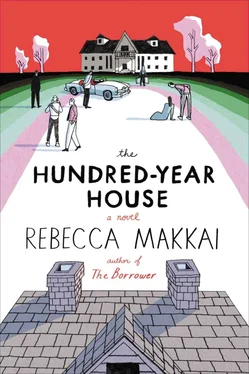And so it was three weeks later that Leland finally came for dinner, and the Bloodhound Gang reunited. Zee was at a conference in New York, and Doug made flatbreads. As they opened the second bottle of wine, Miriam brought her materials up to work on the Happensack, and the men sat watching her and discussing Gracie’s story. Doug had made sure this time to tell it slowly and accurately, hoping he could get Miriam to understand what it was he’d heard that was so persuasive. But when he finished, it was Leland who spoke. “What an amazing load of bullshit! Did Scooby-Doo pop out and rip off her mask?”
“I’m just saying it was convincing, the way she told it. At least she thinks it’s true.”
Leland took a long sip of wine. “She hears the wheelbarrows ‘going off’ to the big house, right? Meaning she was here , in the coach house. So she’s what, a maid or something?” He hit the table. “Can you imagine Gracie in a maid outfit? Can you imagine her cleaning ? Okay, and we have this Max, and we have a gardener. And Max has something to do with the car. And the phone. If it’s 1955, how old is Gracie? If she’s really sixty-two right now.”
Doug calculated. “Eighteen.”
Leland was having fun, it was clear. And possibly showing off for Miriam. She was inscrutable, though, focused on her tessellations. “And then there’s Grace Devohr and George Grant. They’re married, they’ve just moved here, right?”
“The colony closed at the end of ’54,” Doug said. “So it fits.”
“And no one in the entire town knows them. And they get in a car crash.”
“Somewhere close, I think,” Doug said. “Like, on the property.”
“So Max and the gardener roll their bodies away in wheelbarrows, and bury them under the greenhouse.”
“Oh, God ,” Miriam said. “Can we not?”
“I’m just sorting the bullshit from the baloney here. And then follows the most brilliant identity theft of all time. Max and Gracie — whatever her real name is, Molly the Maid — become the Grants. So Zee’s parents — Zee’s the daughter of some maid and butler. Not a Devohr at all. I love it! And no one suspects anything for forty-four years . Eleven presidential terms.”
Doug said, “Well, yeah. Yeah. But honestly, why would they suspect? Look, it doesn’t have to be likely . It just has to be possible . I mean, we think it’s hard to get away with crimes because we only ever know the stories where someone gets caught. So we think everyone gets caught. But we have no idea how much never comes to light.”
“ Maybe ,” Leland said, pointing a finger at him, and for a moment Doug thought he was serious, “maybe Gracie is really Marianne Moore. She’d only be about a hundred ten.”
Doug said, “Look. Look around this town. You think all the millionaires in this town came by their money honestly? You think there were no Cayman accounts, no fraud? I’m just saying weirder things happen every day. And why would she make up a lie that’s self-incriminating? When you lie, you make yourself sound good . Not like a felon.”
“God,” Leland said. “Suddenly you’re a Baptist preacher.”
They looked to Miriam for a verdict. She turned from the Happensack to face them, balanced in a squat. “I’ve been thinking about it. A lot. And no, I don’t believe her. Because people don’t reveal everything the first time you push them. If you think you’re caught, you only tell half the story. Right? But that means whatever she’s covering is worse , or more embarrassing. Something about the colony, maybe. Because that’s the one thing she won’t even talk about.”
Leland said, “Who wants to bet the colony was a front for a sex club!”
“Sex club, arts colony,” Doug said. “What’s the difference.”
But Miriam didn’t laugh. She went back to her mosaic, and they watched in silence as she arranged a two-inch square section on a cookie sheet, using tweezers, and pressed a sheet of sticky contact paper to the top. She spread the mortar quickly on a new patch of board, then pushed the sheet of tiles into it, holding it in place a minute. When she peeled the contact paper away, the pieces were embedded. It was hypnotic: both the way she worked and the Happensack itself. Doug grew dizzy if he stared too long at the unending pathways, the shapes that were clear one second and dissolved the next into chaos. She had incorporated Zee’s pistol cylinder into the bottom right corner, sticking a piece of glass in each compartment. It looked like a flower.
Miriam finally said, “For instance. Let’s say the real Grants truly died. How do we know their deaths were accidents? It’s much more likely the servants killed them.”
Leland said, “Don’t eat any food she cooks.”
Miriam told him to stop.
—
Down on the sunporch, they turned on Miriam’s computer. They were hoping for a wedding photo of Grace Devohr and George Grant, or any adult photo at all, really, but they had no luck. Doug had brought down the photo from Zee’s dresser, the one of her reading with her father, its frame still showing the cracks he’d fixed back in grad school. But there was nothing to compare this picture with. She was about five, so George Grant (based on the marriage license) should have been forty-seven. This man looked closer to sixty — his hair gray, his face well carved. Even Leland and Miriam had to admit it. But then he had those puckish features that can make a man look either older or younger than he is.
Doug had always been drawn to his face, this father-in-law he’d never met. It was his wife’s face, sharp and quick. Small eyes, round ears. He’d always felt he could picture George Grant moving, could hear his voice. Now, Doug tried to imagine this man starting life as someone named Max, someone in charge of the cars. The same driver he’d pictured so many times as he sat in the old Morris chair, the man dreaming of faraway lands. So perhaps Max had reached those lands, ending his days as master of the mansion, critic of the arts, father of a golden child. Doug wanted to believe that life could be like that.
Something had occurred to him: Zee’s middle name was Devohr. It might have been a way to cement Zee’s inheritance, if any questions arose later. It might have been a joke or homage or apology. But Leland and Miriam would only have used this information as proof of Gracie’s lying — and he surprised himself by saying nothing, protecting the story as if it were his own.
“So what’s next?” Leland said as he left. It was funny how they all assumed they’d reunite immediately. But it felt as natural as if these had been Doug’s college roommates, back when “Where are we going tonight?” was not a presumptuous question.
Miriam rubbed her hands together. “Tomorrow’s the day Doug gets the rest of the files,” she said. “It’s time.”
—
With Leland gone, with the kitchen quiet, Doug was antsy. The little house was a boat in icy water. As he helped Miriam put away her tiles, she said, “I have to admit I’m a little freaked out.”
“Don’t let Leland get to you.”
“It’s not — it’s just everything.” She looked a little shaky. “Would it be weird if we camped here, in the kitchen? I’ve got sleeping bags. You could leave once I’m asleep. I mean, like, far apart sleeping bags, not—”
“It wouldn’t be weird.”
Miriam brought out the two shiny blue mummy bags she and Case used for camping back in Texas. They put one on each side of the kitchen table, separated by a little forest of chair legs. Lying there, the finished bits of the Happensack glowing in the light from the window, they talked for another hour.
Читать дальше












